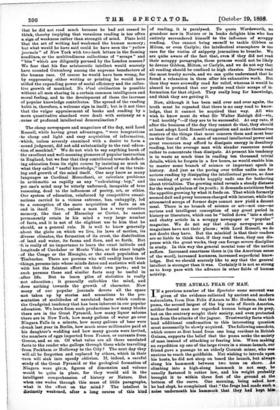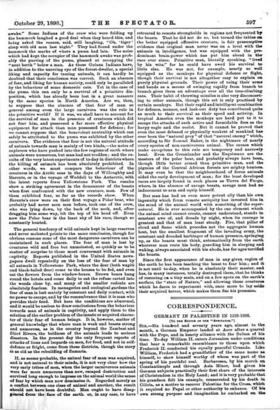THE ANIMAL FEAR OF MAN.
TN a previous number of the Spectator some account was given of the evidence collected by ancient and modern naturalists, from Don Felix d'Azara to Mr. Hudson, that the puma, the second largest of the big cats of South America, neither feared man nor regarded human beings as its prey, but on the contrary sought their society, and even protected man from the attacks of the jaguar. Trustworthy facts which lend additional confirmation to this interesting question must necessarily be slowly acquired. The following anecdote, which comes at first hand from one long resident in British Guiana, supports the belief that the puma seeks the society of man instead of attacking or fearing him. When making an expedition up one of the large rivers in a steam-launch, our friend gave a passage to an elderly Cornish miner, who was anxious to reach the goldfields. Not wishing to intrude upon his hosts, he did not sleep on board the launch, but always slung his hammock between two trees on shore. As climbing into a high-slung hammock is not easy, he usually fastened it rather low, and his weight probably brought it to within three feet of the ground at the bottom of the curve. One morning, being asked how he had slept, he complained that "the frogs had made such a noise underneath his hammock that they had kept him
awake." Some Indians of the crew who were folding up the hammock laughed a good deal when they heard this, and being asked the reason, said, still laughing, "Oh, 'tiger' sleep with old man last night." They had found under the hammock the marks of where a puma had lain. The noise which had kept the occupier of the hammock awake was prob- ably the purring of the puma, pleased at occupying the "next berth " below a man. As these Guiana Indians have, in addition to the unerring eye of the forest-dweller, a special liking and capacity for taming animals, it can hardly be doubted that their conclusion was correct. Such an absence of fear, and liking for human society, could only be paralleled by the behaviour of some domestic cats. Yet in the case of the puma this can only be a survival of a primitive dis- position, which has already been lost in a great measure by the same species in North America. Are we, then, to suppose that the absence of that fear of man so general among even the large carnivora was the rule in the primitive world? If it was, we shall have to account for the survival of man in the presence of creatures which did not fear him, and possessed a far more effective physical equipment for attack than man possessed for defence ; for cve cannot suppose that the benevolent neutrality which can safely be attributed to the puma was exhibited by the other carnivora. The evidence that fear is not the natural attitude of animals towards man is mainly of two kinds,—the notes of explorers who have pushed into the few regions of earth where animals were numerous, but man had not trodden; and the re- sults of the very latest experiments of to-day in districts where the killing of animals has been absolutely prohibited. In other words, we must compare the behaviour of the creatures in the Arctic seas in the days of Willoughby and Barents, or in the voyage of Weddell to the Antarctic, with the latest reports from Yellowstone Park. The results show a striking agreement in the demeanour of the beasts when first confronted with the new creature, man. Few of them exhibited fear, so far as the records show. When Barents's crew were on their first voyage a Polar bear, who probably had never seen men before, took one of the crew, who was lying down, by the back of the neck, and, after dragging him some way, bit the top of his head off. Even now the Polar bear is the least shy of his race, though so constantly hunted.
The general tendency of wild animals kept in large reserves and never molested points to the same conclusion, though for ,obvious reasons none of the most dangerous carnivora can be maintained in such places. The fear of man is lost by creatures wild and free but unmolested, so quickly as to be &natter of surprise to those most conversant with animals in N3aptivity. Reports published in the United States news- papers dwell repeatedly on the loss of the fear of man by all animals in Yellowstone Park, where the deer (both wapiti and black-tailed deer) come to the houses to be fed, and even eat the flowers from the window-boxes. Brown bears hang round the hotels and come daily to eat the refuse carted into the woods close by, and many of the smaller rodents are absolutely fearless. In menageries and zoological gardens the fear of man is lost mainly by constant and daily contact, with no power to escape, and by the remembrance that it is man who provides their food. But here the conditions are abnormal, and it would be useless to draw conclusions from the behaviour towards man of animals in captivity, and apply them to the solution of the earlier problem of the innate or acquired charac- ter of their fear of human beings. It is, however, matter of general knowledge that where man is weak and beasts strong and numerous, as in the country beyond the Zambesi and Shir6 Rivers, the boldness of the animals leads to serious disasters. In the present day the only frequent reports of attacks of lions and leopards on men, for food, and not in self- -defence or fright, come from these districts, though the story as as old as the rebuilding of Samaria.
If, as seems probable, the animal fear of man was acquired, and is not natural to their minds, it is not very clear how the very early tribes of men, when the larger carnivorous animals were far more nnmerous than now, escaped destruction and earvived long enough to impress on the animal world the sense of fear by which man now dominates it. Regarded merely as a conflict between one class of animal and another, the result should not have been doubtful. Man ought to have disap- ['eared &OM the face of the earth. or, in any case, to have
retreated to remote strongholds in regions not frequented by the beasts. That he did not do so, but turned the tables ou the better equipped offensive creature, is fair presumptive evidence that original man never was on a level with the animals in intelligence, but was equipped with the pre- dominant brain-power which has put him ahead in the race ever since. Primitive man, literally speaking, "lived by his wits," for he could have owed his survival to little else. He was not, for example, nearly so well equipped as the monkeys for physical defence or flight, though their survival is not altogether easy to explain on purely physical grounds. Their power of using their arms and hands as a means of swinging rapidly from branch to branch gives them an advantage over all the tree-climbing cats. Their habit of throwing missiles is also very disconcert- ing to other animals, though this art is only practised by certain monkeys. But their rapid and intelligent combination for defence, menace, and look-out duty has contributed quite as much to their survival as their speed and activity. In tropical America even the monkeys are hard put to it to escape the attacks of such active and formidable foes as the harpy eagle and the ocelot. But it cannot be proved that even the most debased or physically weakest of mankind has ever been the "natural prey" of that "natural enemy " which, according to Sir Samuel Baker, is the nightmare of nearly every species of non-carnivorous animal. The causes which make exceptions to this rule are temporary and narrowly locaL Even the Greenlander and the Esquimaux are the masters of the polar bear, and probably always have been, though little better armed than primitive man, and the pigmies of the Central African forests are mighty hunters. It may even be that the neighbourhood of fierce animals aided the early development of man; for the least developed races are largely found in such places as Tierra del Fuego, where, in the absence of savage beasts, savage man had no inducement to arm and equip himself.
But man has had an even more potent ally than his own ingenuity which from remote antiquity has invested him in the mind of the animal world with something of the super- natural. He is ever accompanied by the one element which the animal mind cannot create, cannot understand, stands in constant awe of, and dreads by night, when its courage is greatest and that of man least steady. Fire, that pillar of cloud and flame which precedes not the aggregate human host, but the smallest fragment of the invading army, the constant and dreaded harbinger of human presence, springing up, as the beasts must think, automatically from the earth wherever man rests his body, guarding him in sleeping and waking, always associated with his abode, has for ages terrified the beasts.
Since the first appearance of man in any given region of the earth he has been teaching the beast to fear him ; and it is not until to-day, when he is absolutely their master, and has, in many instances, totally destroyed them, that he thinks of restoring on a tiny scale, and on a few spots on the earth's surface, the " state of Nature," and allowing those creatures which he dares to experiment with, once more to lay aside their acquired terror, which makes them flee his presence.







































 Previous page
Previous page